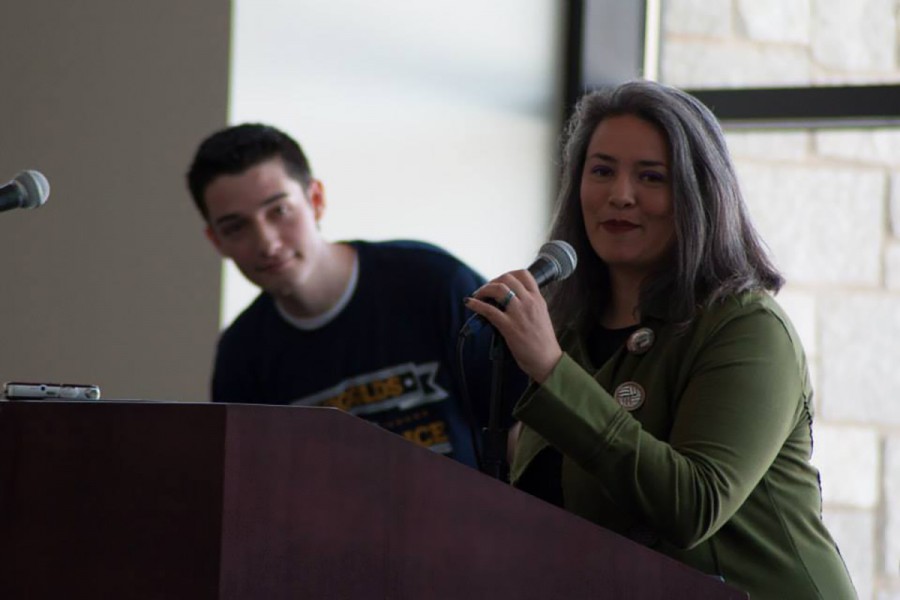Engaging students in local politics
With the Eau Claire City Council elections in April candidates, professors and politically active students encourage involvement from students
More stories from Andee Erickson
Photo by SUBMITTED
Eau Claire City Council member, Catherine Emmanuelle, is seeking re-election in April 2016. In April 2014 Emmanuelle spoke in the Davies Center to UW-Eau Claire students on getting out the vote.
With the Eau Claire City Council elections approaching in April, candidates seeking election are already campaigning for signatures. Current City Council member seeking re-election, Catherine Emmanuelle, received signatures by approaching UW-Eau Claire students in the Davies Center last Tuesday evening.
All five at-large seats on the Eau Claire City Council will expire in April and elections will take place April 5, 2016.
Emmanuelle said students can get educated before voting by contacting candidates for their thoughts and asking what issues are important to them. Since many candidates are active on social media, Emmanuelle said also following them online can provide information as well.
It’s important for students to stay involved and critically engaged in the upcoming elections, Emmanuelle said, and to remember every candidate has to earn every vote.
“In a community where one in five members are part of the university, I think it’s really important to engage the university,” Emmanuelle said. “It would be a totally different community without it.”
Political science professor Rodd Freitag said students can look to daily local news for information on what City Council is doing and to identify candidates who are receptive towards student concerns. Because it’s the at-large election, Freitag said, students have the possibility to well or not do well in terms of electing student friendly candidates.
“In the at-large, all the candidates can come from one part of the city if that’s who wins,” Freitag said.
Since students tend to focus on national politics more than local, Freitag said, they need to remember local government makes decisions on issues citizens confront every day. In Eau Claire, this often includes road quality, city growth, downtown development and street plowing rules.
“In terms of your daily life, you could argue that your quality of life is more directly affected by what your local government is going to decide,” Freitag said.
Anna Schwanebeck, senior political science student and chair of the UW-Eau Claire College Democrats, said the College Democrats will table events to register and inform students before the April 5 election date, which is also the presidential primary election in Wisconsin.
With both elections on the same day, Schwanebeck said it’s a good opportunity to get information to students who don’t normally participate in the local elections.
“Once you help them register, that’s a really easy icebreaker to talk to them afterwards about the candidates and the issues,” Schwanebeck said.
One issue Schwanebeck said students might be interested in involves the new rules regarding alternative side parking. City Council changed the ordinance so cars only need to be moved for snow removal instead of nightly.
Before, this disproportionately affected students, Schwanebeck said, because those living in student-rich neighborhoods often don’t have garages or enough driveway space to park off-street and were more likely to be ticketed.
“There’s a lot of other issues coming up that students should know about,” Schwanebeck said. “And when we get closer to the election that will be something that we’re trying to tell students as we register them.”
Freshman elementary education student Ashtin Hiltunen said a public forum introducing the candidates would help educate students further.
“I think if it was on campus that would be beneficial and students would be more likely to go,” Hiltunen said.
Chair of the UW-Eau Claire College Republicans Erin O’Brien said the organization will also be registering and informing students nearing the elections.
O’Brien said she encourages students to learn more about local politics by reaching out to political science professors and other students who are politically informed, especially within organizations like the College Republicans or College Democrats.
“All of us are relatively informed,” O’Brien said.
The heavy focus on the federal and state elections often leaves the importance of local elections overlooked, O’Brien said, but local government directly reflects issues close to home.


